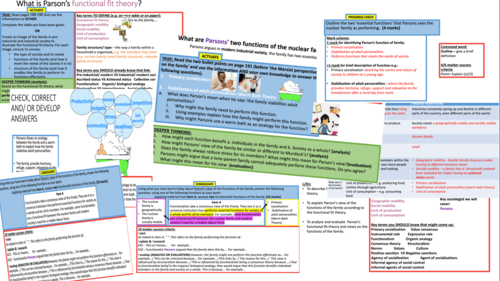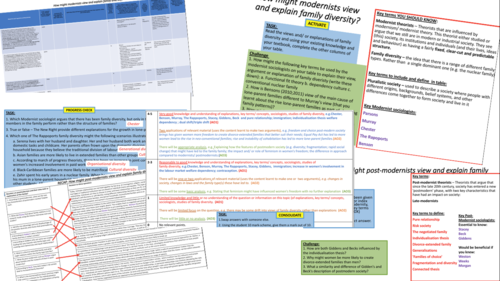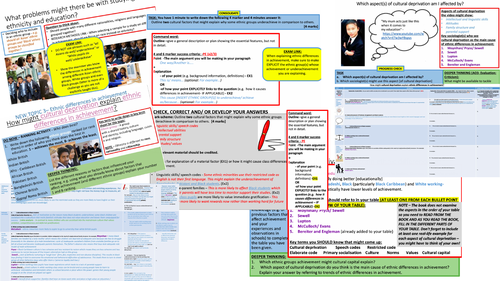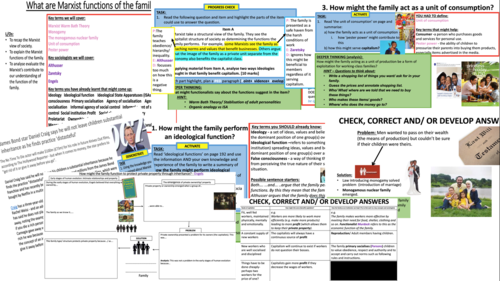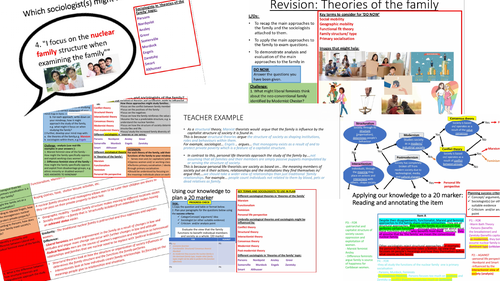
153Uploads
20k+Views
4k+Downloads
All resources

GCSE Sociology - How might sociologists explain behavior?
Explores, norms, values, culture, socialisation (primary/secondary) and social control, agencies and agents of socialisation and social control as an introduction to Sociology.
Also looks at the importance of primary socialisation and the consequences of it inadequately performed.
3 marker with a success criteria and student friendly mark-scheme
Resources can be found at the end of the PPT.
Answers included for main activities
Made to meet the AQA spec but can be used (and edited if needed for other spec)

AQA A-level Sociology Families: Theories of the family – Parson’s view of the family
Detailed and differentiated (up and down) student-led lesson that examines, analyses and evaluates functionalist Parsons view of the family (functional fit theory) and his functions (mainly stabilisation of adult personalities – NOT primary socialisation).
Lesson explores the key terms: Functional fit theory, Stabilisation of adult personalities (Warm Bath Theory), Functional fit theory, Geographic mobility, Social mobility, Unit of production and Unit of consumption.
Lesson makes links to general functionalist key terms and family key terms that students might have previously been taught.
Main activity makes reference to AQA A-level Book 1 by Townsend
***** MOST ACTIVITIES INCLUDE ANSWERS****
Starter assesses prior learning on family topics: couples, childhood and Murdock’s functions.
***** WORKSHEETS AT THE END OF THE PPT**

AQA A-level Sociology: Families Topic 5 ‘Changing family patterns’ Revision lesson
Detailed and differentiated (up and down) student led lesson that
recaps changing family patterns learnt of Family Topic 5 and the reasons for them.
allows students to develop their AO2 (application) and AO3 (analysis) skills by considering the relationship changing family patterns might have with other aspects of the topic, as well as other topic in families and household, such as the domestic division of labour (couples), experiences of childhood (childhood), the characteristic of populations (demography).
***This part of the lesson is very helpful for developing the skills students need for to answer ‘Outline and explain’ 10 markers which requires students to demonstrate the ability to connect two elements, aspects, subtopics, or topics to answer the question. *
concludes by requiring students to apply this knowledge to ‘outline and explain’ 10 markers and one item 10 marker.
RESOURCES CAN BE FOUND AT THE END OF THE PPT.
ANSWERS FOR MOST OF THE ACTIVITIES CAN BE FOUND ON NEXT SLIDE AFTER ACTIVITY SLIDE

AQA A-level Sociology: Families Topic 6 ‘Family diversity’ Revision lesson
Detailed and differentiated (up and down) student led lesson that aims to recap and consolidate student’s knowledge and understanding of:
key sociologists (Parsons, Murray, Chester and Benson, Stacey, Beck, Giddens and more)
key terms (Rapoports’ different types of diversity, neo-conventional Pure relationship, Risk society, negotiated family, individualisation thesis, Divorce-extended family, 'Families of choice’, Fragmentation and diversity, Connected thesis and more) in the family diversity topic of the family unit.
the main difference in modernist and postmodernist views of: society, the family AND explanations of family diversity.
INCLUDES STUDENT FRIENDLY MARK-SCHEME FOR 10 MARKER ON THIS TOPIC
RESOURCES CAN BE FOUND AT THE END OF THE PPT.
ANSWERS FOR MOST ACTIVITIES (Recap and planning activity) INCLUDED AND CAN BE FOUND ON NEXT SLIDE AFTER ACTIVITY SLIDE
INCLUDES ORACY ACTIVITY

AQA A-level Sociology: Education Topic 3 Ethnic differences - Cultural deprivation
Detailed and differentiated (up and down) student led lesson that introduces students to ethnic differences in achievement and explores how different aspects of cultural deprivation (language, attitudes and values, and parental structure) might cause ethnic differences in achievement. To do this, the lesson explores the following key terms: ethnic group, ethnic differences in achievement, cultural deprivation, compensatory education and makes reference to other key terms students should have previously learnt (restricted code, working-class subculture, meritocracy, internal vs external factors, cultural vs material factors)
Uses and refers to ’ AQA A Level Sociology Book One Including AS Level: Book one 3rd Revised edition by Rob Webb, Hal Westergaard, Keith Trobe, Annie Townend ’ textbook
RESOURCES CAN BE FOUND AT THE END OF THE PPT.
ANSWERS FOR MAIN ACTIVITY CAN BE FOUND ON NEXT SLIDE AFTER ACTIVITY SLIDE
*STUDENT FRIENDLY MARK-SCHEME FOR 4 MARKER INCLUDED

AQA GCSE Sociology: Family - Theories of divorce
Includes a ‘teaching to all’ activity that enables students to recap functionalist, Marxist and feminist views of society so that they can better understand their views on divorce.
Includes a 4 marker with scaffolding to help students answer it. Also includes a annotated 4 marker mark-scheme for self and peer-assessment and to enable students to understand how examiners will mark their 4 marker.
ANSWERS TO ALL ACTIVITIES INCLUDED

AQA GCSE Sociology -Education Revision lesson
Description allows students to recap the key terms and sociologists covered in the education unit and apply this to exam questions. Goes through the different types of 4 marker (excluding research methods 4 markers) students can be asked.
ANSWERS TO MOST ACTIVITIES

AQA GCSE Sociology Education - Education policies from 1988 (marketisation)
Detailed lesson with lots of scaffolding based on adaptive teaching that help students understand what impact might marketisation have had on British education system ( define marketisation, the impact of the 1988 Education Reform act on the British education system and the policies it brought about).
Includes ‘teaching to all’ pedagogical technique
Cover the following key terms:
Marketisation
Marketisation of education
Market forces (extension)
Privatisation (of education)
Covers the following reforms:
1988 Education Reform Act
Covers the following policies:
League tables
Ofsted reports
Academies
Free schools
Specialist schools
Open enrolment
Business sponsorship
ANSWERS TO ALL MAIN ACTIVITIES INCLUDED .
Key terms students should know that link: Education reform/ policy Labelling, Streaming, Setting, Banding, Academies, Free-schools, Differences in achievement (class, gender, ethnicity), Internal vs External factors, Local Education Authority (LEA), Social processes
RESOURCES CAN BE FOUND AT THE END OF PPT

AQA A-level Sociology Education Topic 5 Role of education - The New Right view
Detailed student led lesson on the New Right critique and view of the purpose state education adapted to stretch and challenge the most able whilst scaffolding to allow pupils who need support the opportunity to access higher level thinking.
Covers the following key terms:
Neo-liberalism
The New Right
Conservatives
Voucher system
One-size-fits-all approach
League tables
Ofsted reports
National curriculum
Marketisation
Privatisation
Academies
Free schools
State schools
Social policies
Covers the following key sociologists: Chubb and Moe
Uses and refers to ’AQA A Level Sociology Book One Including AS Level: Book one 3rd Revised edition by Rob Webb, Hal Westergaard, Keith Trobe, Annie Townend ’ textbook
BRIEF ANSWERS TO THE MAIN ACTIVITY INCLUDED
NOTES -RESOURCES CAN BE FOUND AT THE END OF THE PPT.

AQA A-level Sociology: Education Class differences in achievement - Streaming and pupil subcultures
Detailed and differentiated (up and down), student led lesson that explores labelling, streaming, differentiation, polarisation, anti-school subcultures, pro-school subcultures, pupil subculture, A-C ecnonomy, educational triage to enable students to understand the role of streaming and pupil subcultures in causing class differences in achievement/ working-class underachievement/ middle-class achievement. Also covers and supports students in answering 4/6 markers using a success criteria and student-friendly mark-schemes.
ANSWERS TO MAIN ACTIVITIES AND EXAM QUESTIONS ARE INCLUDED
**COMES WITH FREE A-LEVEL HELP SHEET AND KEY TERM SHEET FOR TOPIC 1 & 2
**ANSWERS TO MAIN ACTIVITIES INCLUDED
**Made for AQA A-level but can be easily used for other specs (just need a different source of information/ textbook) differentiated down for GCSE) lesson **
Uses and refers to ’ AQA A Level Sociology Book One Including AS Level: Book one 3rd Revised edition by Rob Webb, Hal Westergaard, Keith Trobe, Annie Townend ’ textbook

AQA A-level Sociology Families: Theories of the family – Marxist functions of the family
Detailed and differentiated (up and down) student-led lesson that examines, analyses and evaluates Marxists Althusser, Zaretsky and Engels’ views and functions of the family.
Lesson explores the concepts: Marxist Warm Bath Theory, Monogamy , The monogamous nuclear family , Unit of consumption, Pester power, ideology, ideological function, false consciousness
Lesson makes links to general Marxist key terms and other family key terms that students might have previously been taught.
Main activities makes reference to AQA A-level Book 1 by Townsend
Includes exam questions and guidance for answering them.
***** MOST ACTIVITIES INCLUDE ANSWERS****
Starter assesses prior learning on Parson’s functions of the family
***** WORKSHEETS AT THE END OF THE PPT****

AQA A-level Sociology: Theories of the Family Revision lesson -How to further develop exam answers?
Detailed and differentiated (up and down), student led lesson that:
recaps the key sociologists students learn in this topic and what they say about the function(S) of the family.
recaps the main umbrella theories that students learn in year 12 (structuralism vs interactionism, modernism vs postmodernism and conflict vs consensus theories), how they view society and how this influences functionalist, marxist, feminist and personal life perspective approaches to the family.
how the knowledge above can be applied to exam questions to demonstrate both analysis and evaluation (AO3), e.g. by highlight the similarities and differences between the different theories of family or using knowledge of the umbrella theories to evaluate theories of the family.
supports students with planning a 20 marker on theories of the family using the item.
**RESOURCES CAN BE FOUND AT THE END OF THE PPT.
***
**ANSWERS FOR MOST OF THE ACTIVITIES CAN BE FOUND ON NEXT SLIDE AFTER ACTIVITY SLIDE
**
INCLUDES ORACY ACTIVITY

AQA A-level Sociology: How to further develop exam answers using the AOs? - Couples Revision
Detailed and differentiated (up and down), student led lesson that teaches exam skills and recaps ‘Couples’ content of AQA specification; recaps the main sociologists and themes in the ‘Family’ unit, Topic 1 – Couples WHILST teaching students how to use the Assessment Objectives (AOs) -AO1, AO2, AO3- to further develop their answers using MODEL ANSWERS and examples.
NOTE – Students will need to have gone over or have a basic understanding of using a set success criteria or writing format for their paragraphs TO BE ABLE TO GAIN THE MOST OF OUT THIS LESSON – this lesson using set success criteria PEELE/A (for 20 markers) and PERD (for 10 markers).
**RESOURCES CAN BE FOUND AT THE END OF THE PPT.
**
**ANSWERS FOR MOST OF THE ACTIVITIES CAN BE FOUND ON NEXT SLIDE AFTER ACTIVITY SLIDE
**

AQA GCSE Sociology: Families - The domestic division of labour in contemporary families
Detailed lesson with lots of scaffolding based on adaptive teaching that help students understand what might be the domestic division of labour in contemporary families.
Cover the following key terms: Contemporary society, The Symmetrical family, The New man, Double shift / dual burden, Triple shift, Dual-career family
Covers the following sociologists: Functionalist Young and Wilmott, Feminist Oakley, Feminist Dunscombe and Marsden, Feminist Hochschild
ANSWERS TO ALL ACTIVITIES INCLUDED
Includes icons for visual learning
Includes activity based on ‘teaching to all’ pedagogical technique
Included a key term sheet and definitions for the lesson
RESOURCES CAN BE FOUND AT THE END OF THE PPT
REQUIRES OWENS AND WOODFIELD AQA GCSE TEXTBOOK FOR MAIN ACTIVITIES (OR ANY EQUIVALENT INFORMATION ON DECISION MAKING AND MONEY MANAGEMENT IN THE FAMILY) - for one actvitiy

AQA GCSE Sociology - year 11 introduction lesson
Introduction to detailed lesson with lots of scaffolding based on adaptive teaching that help students understand (e.g. the domestic division of labour, the future of childhood, different views of family diversity, revise the educational policy in the uk’
Go through expectations
Includes a unit concept map for education and family that includes the key terms and key studies for these units
Goes through the success criteria for each type of exam question (EXCLUDING RESEARCH METHODS ONES)
Includes a model answer for each type of exam question (EXCLUDING RESEARCH METHODS ONES)
Includes annotate student-friendly mark-scheme for each type of question (EXCLUDING RESEARCH METHODS ONES)
YOU WILL NEED TO GIVE STUDENTS A COPY OF A PAPER 1 EXAM

AQA GCSE sociology - Research Methods: Observations
Detailed lesson with lots of scaffolding based on adaptive teaching that help students understand what are the strengths and weaknesses of using observations to investigate sociological issues (e.g. identifying the different types of observations and their main features, explain the strengths and weaknesses of using the different types of observations to investigate sociological issues and to apply our knowledge of strengths and weaknesses of one or ore observations to an exam question.
Covers the following key terms:
Observation
Participant observation
Non-participant observation
Covert observation
Overt research
Hawthorne / Observer effect
Observation schedule
Overt research (extension)
Covert research (extension)
Key terms you should know that link:
Pre-determined - Closed questions - Open questions - Quantitative data vs
Qualitative data - Reliable vs Valid - Practical issues - Ethical issues - Theoretical issues - Positivism vs Interpretivist - Sample size - Representative sample - Generalise findings - Respondent - Standardised
ANSWERS TO ALL ACTIVITIES INCLUDED
Includes an exam style 4 marker with scaffolding and a detailed student friendly mark-scheme
Does NOT cover structured and unstructured observations as it is not in the specification and its quite complex.
Includes a key term sheet and definitions

AQA GCSE Sociology: Family- Family diversity
Detailed lesson with lots of scaffolding based on adaptive teaching that help students understand family diversity.
Includes a 4 marker with scaffolding to help students answer it.
Progress check can be taught as ‘teaching to all’ activity by getting students to show the family diversity they think is the answer on their fingers (1-5)s
Includes key term and definitions sheet for the lesson (new key terms and key terms students should have previously learnt that link to the lesson)
ANSWERS TO MOST ACTIVITIES INCLUDED
Covers the following key terms: Organisational diversity, Cultural diversity, Social class diversity , Cohort/ generational diversity, Life course diversity, Secularisation, Monogamy , Polygamy , Polygyny, Polyandry , Arranged marriage
Covers the following sociologists: 1969 Divorce Reform Act, 1970 Equal Pay Act, 2013 Marriage Act, The Rapoports Goode
Covers the following key terms that you should already know: Dual-career family, Family form/ structure/ type, Nuclear family, Conjugal roles, Conventional nuclear family, Lone-parent family, Vertically-extended family, Cohabitation , Same sex family, Horizontally-extended family , Empty-nest family, Family diversity, Contemporary society, Gender roles
Makes references to key terms students should know – Promotes a spiral curriculum by making links to key terms that students might have previously been taught that link to this lesson.
RESOURCES CAN BE FOUND AT THE END OF PPT

AQA GCSE Sociology: Key term and definitions sheet - Research methods
6 page key term sheet for the research methods unit of GCSE AQA Sociology.
Made for AQA GCSE but can be used for A-level and other specs (might need to add on key terns)
Alphabetical order
EDITABLE
Includes: colour coding, examples and dome dual coding.
Matches to the key term sheets and definitions used in my AQA GCSE lessons.
Includes some key terms that link to the unit that students do not have to know but would benefit them if they did know.

AQA GCSE Sociology: Families - The traditional domestic division of labour
Detailed lesson with lots of scaffolding based on adaptive teaching that help students understand what might be the domestic division of labour in traditional families.
Covers the following key terms: Domestic labour, Domestic division of labour, Conjugal roles, Joint conjugal roles, Segregated conjugal roles, Instrumental role, Expressive role
Covers the following sociologists: Parsons, Oakley
Includes an activity based on ‘teaching to all’ pedagogical technique
Makes links to functionalist and feminist views of society that students might have learnt previously
Includes icons for visual learning
ANSWERS TO ALL ACTIVITIES EXCLUDING FOR PLENARY
Includes an Item B 4 marker and detailed scaffolding to help students answer this (see worksheet for this)
RESOURCES CAN BE FOUND AT THE END OF PPT

AQA GCSE Sociology: Family - Changing family patterns
Explores the patterns of the following: reconstituted families, one-person households, dual career families, fertility and childbearing, lone-parent, same-sex couples, extended families and cohabitation.
Starter activity allows students to go through a model 12 mark answer on divorce
Provides and activity to develop students ability to read and interpret exam items.
ANSWERS TO SOME ACTIVITIES INCLUDED
RESOURCES CAN BE FOUND AT THE END OF THE PPT
Includes a key term and definition sheet for the lesson (new key terms and makes links to key terms students should have previously learnt that link to this lesson).


